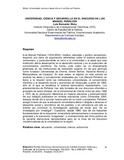Mostrar el registro sencillo del ítem
Universidad, Ciencia y desarrollo en el discurso de Luis Manuel Peñalver
| dc.rights.license | http://creativecommons.org/licenses/by-nc-sa/3.0/ve/ | |
| dc.contributor.author | Weky, Luis Bernardo | |
| dc.date.accessioned | 2017-04-27T18:11:25Z | |
| dc.date.available | 2017-04-27T18:11:25Z | |
| dc.date.issued | 2016-07 | |
| dc.identifier.issn | 2244-7008 | |
| dc.identifier.uri | http://www.saber.ula.ve/handle/123456789/43348 | |
| dc.description.abstract | Luis Manuel Peñalver (1918-2004) –médico, educador y político venezolano- esgrimió una serie de argumentos reformistas sobre el sistema educativo venezolano, y particularmente en torno a la universidad y el papel que esta institución debía desempeñar en el desarrollo nacional y en la producción de conocimientos científicos. De hecho, esta visión se ve directamente plasmada en las instituciones de educación superior en las que participó como fundador (Universidad de Oriente, Simón Bolívar, Nacional Abierta y Metropolitana de Caracas). En este orden, el objetivo en este artículo es analizar las ideas y concepciones empleadas por Luis Manuel Peñalver en torno a la relación entre las instituciones universitarias, el conocimiento científico y el desarrollo social y económico de Venezuela, a partir de 1958, año en el que se establece el sistema democrático representativo. Los planteamientos de Peñalver han sido tomados de sus discursos ofrecidos a propósito de actos oficiales de la Universidad de Oriente entre los años 1960 y 1970, de su producción intelectual en materia educativa y particularmente de sus trabajos publicados en revistas educativas como Universitas 2000, espacio donde dio a conocer buena parte de su visión y propósitos. Peñalver acogió la tesis de que la educación universitaria debía ir dirigida a alcanzar el desarrollo social y económico de los pueblos, y en coherencia con ello su interés por promover la investigación aplicada de modo que “no se investigara por investigar”; Cuestionó, desde 1960, dos de los baluartes fundamentales de la educación universitaria latinoamericana y venezolana: la gratuidad y la autonomía “exagerada”, a contracorriente del clima político de la naciente democracia representativa pero en la línea de los discursos modernizadores de la universidad en la región. | es_VE |
| dc.language.iso | es | es_VE |
| dc.rights | info:eu-repo/semantics/openAccess | |
| dc.subject | Educación | es_VE |
| dc.subject | Universidad | es_VE |
| dc.subject | Ciencia | es_VE |
| dc.subject | Autonomía | es_VE |
| dc.title | Universidad, Ciencia y desarrollo en el discurso de Luis Manuel Peñalver | es_VE |
| dc.title.alternative | University, science and development of Luis Manuel Peñalver speech | es_VE |
| dc.type | info:eu-repo/semantics/article | |
| dc.description.abstract1 | Luis Manuel Peñalver (1918-2004)–a Venezuelan doctor, educator and politician- used a set of reformist arguments about the Venezuelan educational system, and particularly about the university and the role it should have in the national development and production of scientific knowledge. In fact, this view is directly reflected in the institutions of higher education in which he participated as founder (Universidad de Oriente, Simón Bolívar, Nacional Abierta & Metropolitana de Caracas). So, this paper aims to analyze the ideas and conceptions used by Luis Manuel Peñalver about the relationship between universities, scientific knowledge and the Venezuelan social and economic development, from 1958, year in which the democratic representative system was set. Peñalver’s approaches have been taken from his offered speeches regarding an official ceremony at the Universidad de Oriente between 1960 and 1970, his intellectual production in education and particularly from his publications in educational journals such as Universitas 2000, where he made public a big part of his view and purposes. Peñalver accepted the thesis that higher education should be focused to achieve peoples’ social and economic development, and coherent with that, his interest to promote applied research so that “no research for just investigating”; he questioned, since 1960, two of the main bastions of Latin American and Venezuelan university education: free and "exaggerated" autonomy, against the current political environment of the nascent representative democracy, but in the line of the modernizing university speeches in the region. | es_VE |
| dc.description.colacion | 33-51 | es_VE |
| dc.description.email | iweky@unet.edu.ve | es_VE |
| dc.description.frecuencia | Semestral | |
| dc.identifier.depositolegal | PPI200302ME3529 | |
| dc.publisher.pais | Venezuela | es_VE |
| dc.subject.institucion | Universidad de Los Andes | es_VE |
| dc.subject.keywords | Education | es_VE |
| dc.subject.keywords | University | es_VE |
| dc.subject.keywords | Science | es_VE |
| dc.subject.keywords | Autonomy | es_VE |
| dc.subject.publicacionelectronica | Revista Bitácora-e | |
| dc.subject.seccion | Revista Bitácora-e: Artículo de Investigación | es_VE |
| dc.subject.thematiccategory | Artes y Humanidades | es_VE |
| dc.subject.tipo | Revistas | es_VE |
| dc.subject.unidadinv | Grupo Venezolano de Historia y Sociología de la Ciencia (GVHSC) | es_VE |
| dc.type.media | Texto | es_VE |
Ficheros en el ítem
Este ítem aparece en la(s) siguiente(s) colección(ones)
-
Bitácora-e - 2016 - Número 002
Julio - Diciembre 2016


